HighPoint's RocketU 1144A PCIe x4 USB 3.0 Controller: A Big Back-end
by Zach Throckmorton on August 30, 2011 8:26 AM ESTWhile most current-gen motherboards ship with at least two USB 3.0 ports, many users either have no USB 3.0 ports at all or two ports simply aren't enough. Almost all PCIe USB 3.0 controller cards available today use the PCIe x1 interface, with a maximum bandwidth of 5Gbps. Furthermore, these PCIe x1 USB 3.0 controller cards split multiple USB 3.0 ports between one 5Gbps USB 3.0 controller - so if you're using a single USB 3.0 controller PCIe x1 expansion card with four ports, and you're using all four ports, each port's maximum bandwidth is 1.25Gbps. HighPoint's RocketU 1144A offers a PCIe x4 interface and therefore a 20Gbps back-end - and each of its four USB 3.0 ports has its own Asmedia ASM104x USB 3.0 controller, so each port can provide 5Gbps potential bandwidth.
The SATA II interface's maximum bandwidth is 3Gbps, and the latest SATA III standard maxes out at 6Gbps. While most devices are incapable of saturating these interfaces, higher-performance SSDs and SSD arrays can often deliver in excess of 1Gbps. Transferring data between multiple internal SSDs and SSD arrays to multiple external USB 3.0 SSDs or HDD arrays simultaneously can potentially choke a PCIe x1 interface.
Testing the RocketU
Given the massive theoretical bandwidth promised by the RocketU 1144A, we wanted to see if we could find its real world limits. The card installed easily and installing the software and drivers also proceeded without issue. First, I grabbed the best-performing USB 3.0 flash drives from our recent USB 3.0 flash drive round up, the Patriot Supersonic Magnum, SuperTalent RC8, Patriot Supersonic, Mushkin Ventura Pro, and Kingston DataTraveler Ultimate. Unfortunately, due to the horizontal orientation and close placement of the ports on the HighPoint controller card, I was only able to use three of the smaller drives for the test.
Inserting two of even the smallest USB 3.0 flash drives into the controller card's adjacent ports requires forcing and wedging them into position.
Unsurprisingly, Iometer indicates even our fastest flash drives are nowhere near capable of filling the RocketU's bus - not even when all three are utilized simultaneously:
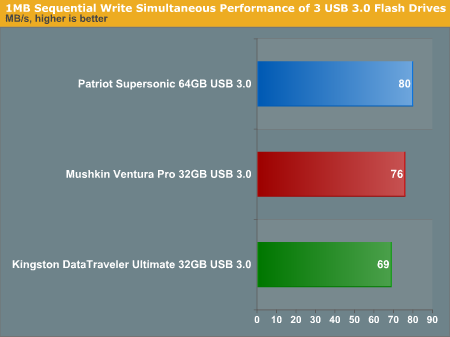
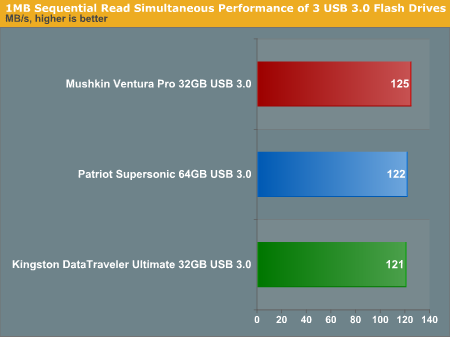
All of these simultaneous transfer rates are essentially identical to our results testing each drive individually, one at a time. Note that testing two of these drives simultaneously in a two USB 3.0 port enabled motherboard yielded the same results.
The fastest USB 3.0 flash drives are nowhere near as fast as the fastest SSDs. So we hooked up both Patriot's Pyro 120GB and Corsair's Force GT 120GB SSDs, which Anand reviewed a few weeks ago. Each drive was attached via a USB 3.0 dock. Because USB cables are smaller than flash drives, we were able to simultaneously test two flash drives and two SSDs. Iometer indicates we're still not approaching the RocketU controller card's capacity:
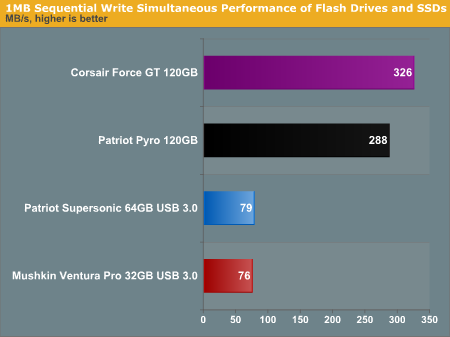
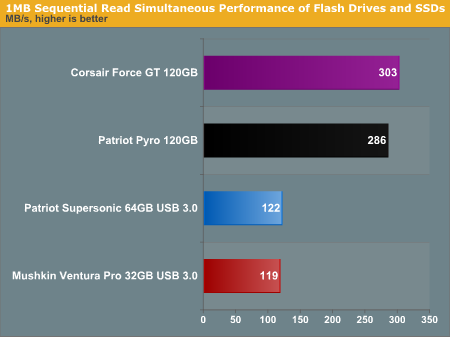
Again, not even two flash drives and two SSDs can saturate the RocketU's bus. Then again, two SSDs can't saturate the bus of a two USB 3.0 port enabled motherboard, either.
An individual SSD isn't as fast as two (or more) SSDs configured in RAID 0. We inserted two USB 3.0 flash drives as well as the Patriot Pyro and Corsair Force GT SSDs in (basic Windows 7 software) RAID 0 into the RocketU.
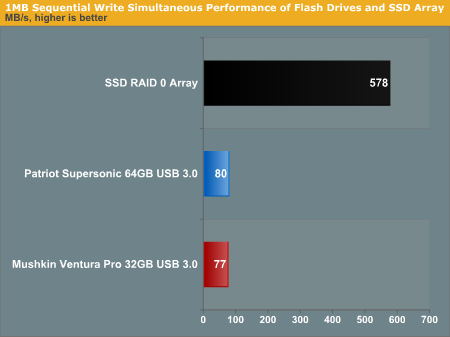
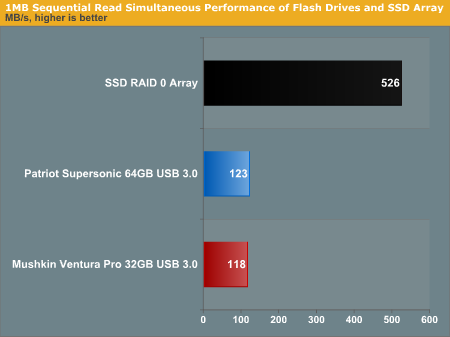
Even the two of the fastest SSDs in RAID 0 and two of the fastest USB 3.0 flash drives don't choke the RocketU. That said, the two SSD RAID 0 array performs similarly on a two USB 3.0 port enabled motherboard.
Conclusions
HighPoint's RocketU 1144A is available from Amazon right now for less than $100. While four USB 3.0 port PCIe x1 controller cards aren't common, most models cost less than half as much as the RocketU. For typical home users, the HighPoint 1144A is likely overkill - there are adequate solutions available at lower cost. We couldn't even push it to its limits with one array of the fastest SSDs. However, if you are a power user with multiple internal and external SSD arrays (or large HDD arrays), then the 1144A is a compelling product. Of course, these conclusions are in the context of current hardware. As SSDs continue to get faster and faster, it wouldn't surprise me if, in a few years, there are affordable external SSDs that would work best with the 1144A.
I was pleased by the controller card's stability and functionality - despite repeated hot swapping of various devices, it never stopped recognizing anything, unlike many other controller cards and motherboards that sometimes require a system restart to resume functioning after repeated hot swapping. I was not pleased by the port placement - though multiple flash drive usage is not the intended usage pattern for the card, there might be times when you'd want to unhook your drive arrays and drop some data onto a bunch of flash disks. Regardless, HighPoint should be commended for bringing this product to market - it's always better to have capacity available and not need it than need it and not have it available!


_575px.JPG)








38 Comments
View All Comments
fancarolina - Tuesday, August 30, 2011 - link
The first picture says it all. You can tell they never tested the card with any real world USB 3.0 Devices like eg. those flash drives. When you have to force them in place to connect them. That is bad, you can't help but believe with a bit more testing they could have found better spacing for the ports. So that devices could plug you know plug in.StealthX32 - Tuesday, August 30, 2011 - link
On the other hand, people rarely use two USB flash drives simultaneously.If you do it a lot, then fork up the $2 for an extension cable.
Googer - Thursday, September 8, 2011 - link
With 4 ports, i think its stupid to call this anything more than a minor flaw. I doubt anyone will ever have 4 thumb drives attached at any given moment. Persoanlly, I'd rather see them cram an extra closely spaced port in than to have few more widely spaced USB ports. Just like when a wall wart blocks some of my outlets, I grab the trusty old extension cable and free them up. (in this case, a usb3 hub would suffice)rtallmansu - Tuesday, August 30, 2011 - link
This is not a lack of testing at all. While I agree that it would be nice if the ports were spaced out more for these larger flash drives, you have to understand that there is a specification that HighPoint is following for the distance that two USB ports are apart. This is why all USB ports that you see in either the vertical or horizontal position are always the same distance apart from any manufacture. The problem really lies with the flash drive makers that are building devices out of USB connector specs, because people want larger capacity drives that can’t be fit into the proper form. If you want a larger capacity drive that requires a larger form factor then buy a couple dollar adaptor cable or a drive that comes with one.PyroHoltz - Tuesday, August 30, 2011 - link
I think your point is a little unrealistic. The card has 4 ports across the back plate. If someone wanted to use two highspeed(read:wide) thumb drives, then they could easily just move to another port. I think the author was making a very specific point while also trying to saturate one leg(side) of the bus.fcx56 - Tuesday, August 30, 2011 - link
I agree completely, however I feel I should point out that each slot has it's own 3.0 controller, so your conclusion that the author was attempting to push "one leg(side) of the bus" is flawed.JohnMD1022 - Tuesday, August 30, 2011 - link
I keep USB cables in an assortment of lengths, from 6 inches on up.Problem solved.
mino - Wednesday, August 31, 2011 - link
How many of those are USB3 ... just noting as USB3 cables are nowhere as cheap as USB2 ...Spazweasel - Wednesday, August 31, 2011 - link
Thumb drives are not the targeted devices for this product. External drives and drive arrays, video sources, and high-end scanners are. Such devices are attached with cables which will live side-by-side without issue. For people using thumb drives and who want to use the same controller at the same time as their other devices, NewEgg has USB 3.0 extension cables for $4.99. (as a point of comparison, the cheapest USB 2.0 extension cable they list is $2.99, so it's a $2 premium).Cost is not an issue.
Lohkay - Tuesday, August 30, 2011 - link
Would it possible to verify if you can select from the bios a device connected to that card for booting? Almost every card out there and motherboards uses the NEC chip which doesn't allowing booting off USB3.